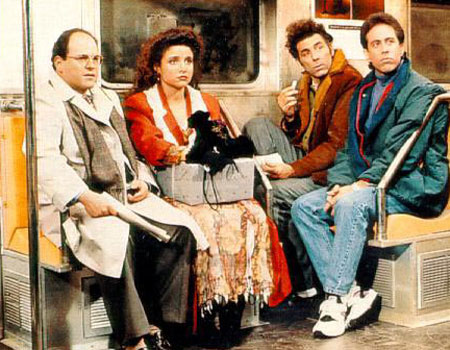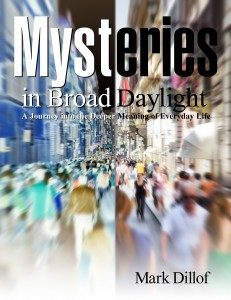“God protect me from my friends.” — Anonymous
We had previously analyzed the episode of Seinfeld, in which George Costanza — realizing that every decision that he has made in life has turned out to be a bad one — decides that, from now on he will do the exact opposite of what his usual instincts tell him to do. As a result, George’s situation in life undergoes a dramatic improvement. He gets an attractive girlfriend; he moves out of his parent’s house; and he gets a dream job with the New York Yankees. What interests us here, though, is how George’s transformation affects his friendships.
The person whom it specifically affects is Elaine. After George’s transformation, everything begins to go wrong for her. Elaine gets thrown out of her apartment. And carelessness, on Elaine’s part, causes her publishing house to lose a major contract. Sitting at their familiar restaurant table Elaine, Jerry, and Kramer discuss the matter:
Elaine : Do you know what’s going on here? Can’t you see what’s happened? I’ve become George.
Jerry : Don’t say that.
Elaine : It’s true. I’m George! I’m George!
Elaine realizes, in horror, that she has inherited George’s bad fortune. But, is this really possible? It is, according to what is known by psychologists as “family systems theory.” The theory contends that there are certain roles available to family members. If, for example, one family member is the serious scholar, that role is now taken and a younger member of the family needs to adopt a different role. It might, for example, be that of underdog, rebel, clown, or athlete. This same claiming of roles also occurs in relationships. For example if one person takes the role of being careless with money, the other partner will have to become the responsible one.
What interests us here is how these family systems dynamics apply to friendships. Since George — after his “do the opposite” transformation — is no longer the schlemiel, or hapless loser, someone else, out of a curious psychological necessity, must assume that role. That person could have been Jerry or Kramer, but, for whatever the reason, the curse falls on Elaine. Jerry attempts to offer Elaine a kind of philosophical solace: “Elaine, don’t get too down. Everything’ll even out, see, I have two friends, you were up, he was down. Now he’s up, you’re down. You see how it all evens out for me?”
People intuitively realize that this dynamic exists, which is why, if another person — their a family member or a friend — starts to do better, they might try to trip him or her up. Usually, this dynamic occurs unconsciously. It can, though, be quite conscious and demonic, as illustrated by the film “The Razor’s Edge.” (1946). Sophie is a recovering alcoholic. Larry, her new husband, has helped her go straight. Isabel, out of jealousy over Sophie’s marriage to Larry, tempts Sophie to return to her drinking. Usually, the efforts by other people to bring us back to who we had been is not so egregious, as in that film. But it can be all the more insidious, in its subtlety.
The Sense of Betrayal
Often, those who knew the transformed person as a suffering sad sack, will feel betrayed. They will feel betrayed out of an inner sense that these roles had been agreed upon, and now these roles have been changed or even reversed. Sometimes, it is simply the case that a friendship is predicated on the roles that two people have been playing. When one of the pair changes, the other person will often feel that he has lost a friend, simply by virtue of the person no longer being the person whom he had been.
Indeed, friendship may simply no longer be possible. Consider, for example, Shakespeare’s King Henry IV, (Part Two). When Prince Hal becomes king, he rises to the occasion, putting aside riotous living. He becomes a serious and responsible person, as befits his new role in life. When Hal, now Henry the Fifth, is greeted by Sir John Falstaff, his former drinking and carousing buddy, he coldly replies: “I know ye not old man.” Falstaff is crushed by Hal’s words.
Sometimes, the feeling of betrayal may also have another sense to it. Most people have a sense that they need to change their life around. When they see that a friend has done precisely that, they feel threatened by a kind of inner accusation: “See, your friend Mary has changed. Why can’t you.” It is true that misery loves company, so if we renounce our formerly miserable state, we are no longer good company to those who are still miserable.
Dread of the Uncanny
There is another, more fundamental, sense of what happens to friendships, should one of the friends undergo a significant psychological change. A real change can be frightening, for other people. More specifically, it evokes the uncanny, of which Freud — in his 1919 essay “The Uncanny” — perceptively observed that there is nothing more terrifying. What makes it so? Our sense of reality is predicated on objects and people being who they are. Should that no longer be true, so long to reality and sanity as well.
It’s true that we may enjoy the transformations that a magician on stage brings about, for we know, full well that it involves trickery. But, if we witnessed real magic — one thing or person actually transforming into something or someone else — we would likely get sick to our stomach or faint, for we would become unhinged from our fundamental orientation to the world.
In point of fact, people do, on rare occasion, undergo a major transformation. It can then unhinge his friends and family. It is unsettling to realize, as have the existentialists, that the self is not a fixed thing, an object, but is what Kierkegaard called “a freedom,” a freedom that is fluid and can become anything. For their own psychological survival, they may seek, as much as possible, to try to bring him back to who he had been before the transformation.
Needless to say, not all friends and family members are nefarious in this way. Some, quite the contrary, are genuinely delighted by the person’s transformation, and experience a beneficent joy that he or she who had been lost is now found. That felicity is dramatized Dickens’ story “The Christmas Carol,” when Scrooge undergoes something akin to a spiritual rebirth. If anything, the change can be a relief for everyone concerned. Now, for example, they need no longer be burdened by an irresponsible fool who had been a financial and emotional drain for the family. Or perhaps the person had formerly been overly somber and serious, but now she is lighthearted and a pleasure to be around.
That said, there is still often a psychological investment, on the part of certain friends and family members, to bring us back to being the person we had been, for they dread the uncanny. The subtext of everything they say and do is: “Please, for the sake of my sanity, be the person familiar to me!” Thus, one of the serious obstacles, for those who wish to change their life, is the expectations of other people. And that is why it is often necessary, when we have undergone a change, to leave town. Of course, that is not always feasible. Sometimes, after a break with the past, former friendships can be renewed, but if they are, they would have to be reformed on a much different basis.




